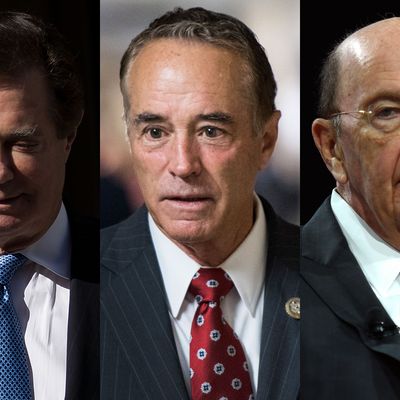
The entire Trump era has been a festering pit of barely disguised ongoing corruption. But the whole sordid era has not had a 24-hour period quite like the orgy of criminality which we have just experienced. The events of the last day alone include:
(1) The trial of Paul Manafort, which has featured the accusation that President Trump’s campaign manager had embezzled funds, failed to report income, and falsified documents. His partner and fellow Trump campaign aide, Rick Gates, confessed to participating in all these crimes, as well as to stealing from Manafort.
(2) Yesterday, Forbes reported that Commerce Secretary Wilbur Ross may have stolen $120 million from his partners and customers. Meanwhile Ross has maintained foreign holdings in his investment portfolio that present a major conflict of interest with his public office. (The “Don’t worry, Wilbur Ross would never do anything unethical just to pad his bottom line” defense is likely to be, uh, unconvincing to the many people filing suit against Ross for allegedly doing exactly that.)
(3) Also yesterday, ProPublica reported that the Department of Veterans Affairs is being effectively run by three Trump cronies, none of whom have any official government title or public accountability. The three, reports the story, have “used their influence in ways that could benefit their private interests.”
(4) And then, this morning, Representative Chris Collins was arrested for insider trading. Collins had been known to openly boast about making millions of dollars for his colleagues with his insider knowledge. He is charged with learning of an adverse FDA trial, and immediately calling his son — from the White House! — urging him to sell his holdings.
It has been, in sum, quite a day.
Some level of corruption is an inescapable part of political life in general, and certainly Democrats are not (and never have been) immune to it. But it has been especially chronic in the modern Republican Party, whose last experience with control of government ended in a series of corruption scandals so blatant they provoked widespread soul-searching on the right as to how the party and the conservative movement could so easily open itself up to grifters. (Remember Jack Abramoff? Bob Ney? Tom DeLay? Grover Norquist?) The temptation to use government as a vehicle for self-enrichment is especially strong in a party dedicated to a credal skepticism about the possibility government can do good.
But the Trump administration has, even in its embryonic stage, already brought it all to a new level. Several possible explanations present themselves. Trump appears to select for greed and dishonesty in his cronies. (Collins does not work in the administration, but was Trump’s first endorser in Congress.) The sorts of people Trump admires are rich and brash and disdainful of professional norms, and seem unlikely to rat on him. The sorts of people who are apt to work for Trump seem to be those who lack much in the way of scruples.
The administration is understaffed and disorganized to the point of virtual anarchy, opening up promising avenues for insiders to escape accountability. Trump’s public ethos, despite his professions during the campaign that he could “drain the swamp” and impose a series of stringent ethics reforms, runs toward relativism — he famously tolerates anybody who supports him, regardless of criminal history or other disqualifications, defining their goodness entirely in terms of personal loyalty. And above all there is the simple fact that Trump himself is a wildly unethical businessman who has stiffed his counterparties and contractors, and worked closely with mobsters, his entire career. A president who is continuing to profit personally from his office is hardly in any position to demand his subordinates refrain from following suit.
It has been frequently noted that the president is molding the party in his nationalist, populist, authoritarian image. He is likewise molding its governing class after his own personal business ethos.






























